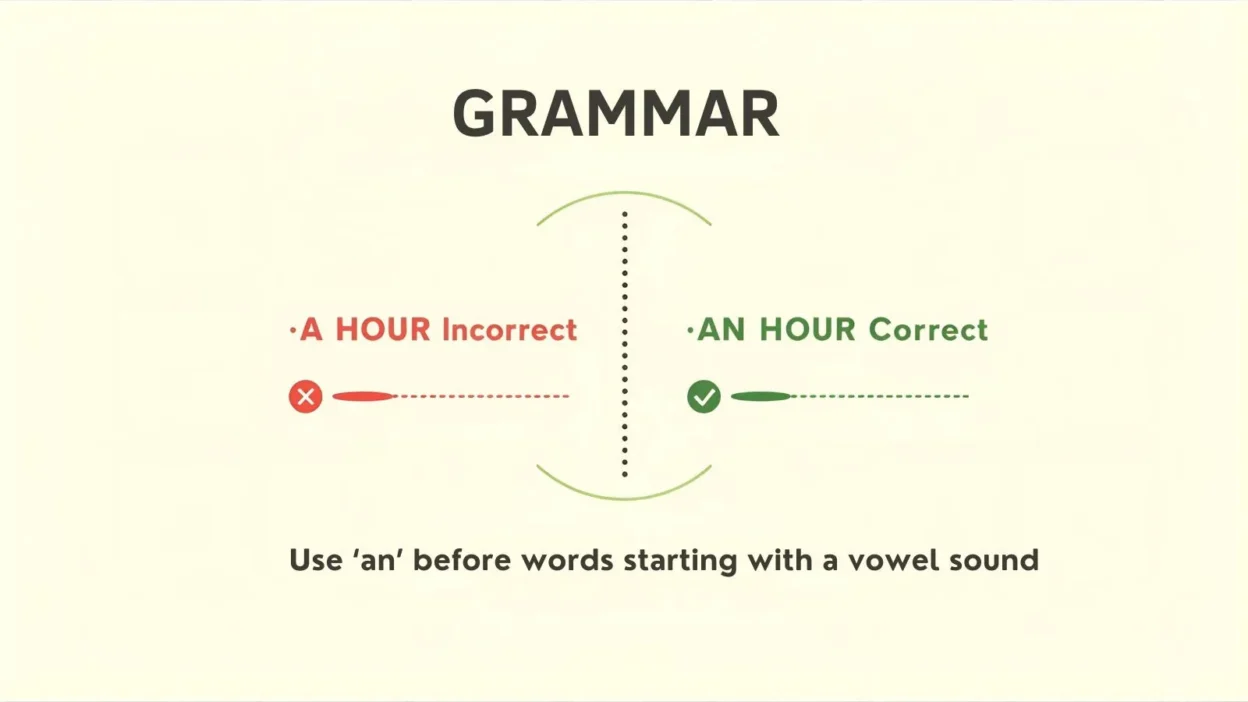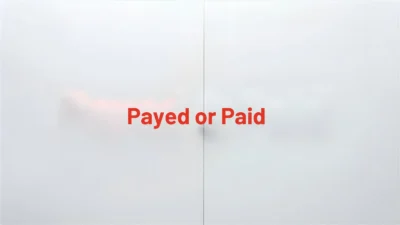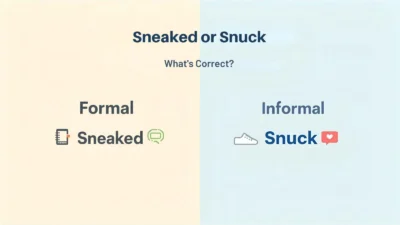Have you ever paused mid-sentence, wondering whether to say a hour or an hour? You’re not alone!
Many English learners—and even native speakers—get confused by this small but tricky rule. If you’re searching for clarity on “A Hour or An Hour,” this quick guide is for you.
In just a few minutes, you’ll understand why one is correct and the other isn’t—and you’ll never second-guess it again.
Let’s clear up the confusion once and for all!
🕓 A Hour or An Hour – Quick Answer ✨
✅ The correct phrase is “an hour.”
You should use “an” before words that start with a vowel sound, not just a vowel letter.
The word “hour” begins with a silent “h”, so it sounds like it starts with a vowel: our.
✅ Examples:
- ✅ Correct: I’ll be there in an hour.
- ❌ Incorrect: I’ll be there in a hour.
👉 Think of the pronunciation, not the spelling!
🕕 The Origin of “An Hour” 🕰️
The confusion comes from how English has evolved.
In Old English, the word hour came from the Latin hora (meaning “time” or “season”). When borrowed into English through Old French (hore), the initial “h” was silent — and it still is today.
That’s why we say “an hour”, because the sound starts with a vowel (the “ow” sound).
However, many other “h” words — like house, happy, and hat — have a pronounced “h,” so we use “a” with them (e.g., “a house,” “a hat”).
So, the reason is rooted in pronunciation history, not just modern grammar.
🕗 British English vs American English Spelling 🇬🇧🇺🇸
Good news! Both British and American English agree — it’s “an hour.”
The pronunciation and grammar rule are identical in both dialects. The only difference may be accent, not spelling or article usage.
🧾 Comparison Table
| Region | Correct Form | Notes |
|---|---|---|
| 🇬🇧 British English | an hour | “H” is silent, vowel sound |
| 🇺🇸 American English | an hour | Same as British |
| 🇨🇦 Canadian English | an hour | Same rule applies |
| 🇦🇺 Australian English | an hour | No variation |
👉 In all major English variants, “an hour” is the only correct form.
🕘 Which Spelling Should You Use? 🌍
No matter where you live — the U.S., U.K., Canada, or anywhere else — always use “an hour.”
This is because pronunciation rules are universal for this word. Even if your accent slightly emphasizes the “h,” the standard accepted usage is “an hour.”
🌎 Audience-based advice:
- Students & learners: Always write “an hour.”
- Content writers: Use “an hour” for SEO correctness and readability.
- Professionals & teachers: “An hour” is the only form accepted in formal writing.
✅ Rule of thumb: If the “h” is silent, use “an.” If the “h” is pronounced, use “a.”
🕛 Common Mistakes with “A Hour or An Hour” ⚠️
Many learners make these mistakes — here’s how to fix them:
| ❌ Incorrect | ✅ Correct | Explanation |
|---|---|---|
| a hour | an hour | “H” is silent → vowel sound |
| a honest man | an honest man | “H” silent in “honest” too |
| an house | a house | “H” pronounced → use “a” |
| an historic | a historic (modern) | Depends on accent; “a” preferred today |
Tip: Say the phrase aloud. If it sounds smoother with “an,” that’s probably correct.
🕒 “An Hour” in Everyday Examples 📚
Here’s how you’ll see “an hour” used naturally across contexts:
💬 Everyday speech:
- “Give me an hour to finish this task.”
- “It’ll take an hour to reach there.”
📰 News:
- “Rescue teams arrived an hour after the incident.”
📱 Social media:
- “Waited in line for an hour just for coffee! ☕”
🧾 Formal writing:
- “The meeting lasted an hour and covered all agenda points.”
As you can see, “an hour” is consistent in all types of writing — casual or professional.
🕤 “A Hour or An Hour” – Google Trends & Usage Data 📊
Google Trends data shows that “an hour” dominates searches globally, while “a hour” appears only as a common grammar mistake.
🌐 Global Usage Comparison
| Term | Popularity | Correctness | Usage Context |
|---|---|---|---|
| an hour | ⭐⭐⭐⭐⭐ | ✅ Correct | Standard everywhere |
| a hour | ⭐ | ❌ Incorrect | Common learner error |
Search patterns show that users often look up “a hour or an hour” from countries like India, the U.S., and Nigeria — mostly to confirm correct grammar before writing professionally.
FAQs: 🙋
1. Why do we say “an hour” instead of “a hour”?
Because “hour” starts with a vowel sound (“our”), and the “h” is silent.
2. Is it ever okay to say “a hour”?
No. It’s always incorrect in standard English.
3. Do we use “an” before all words starting with “h”?
Only if the “h” is silent — like “an hour,” “an honor,” or “an honest man.”
4. Why does pronunciation matter more than spelling here?
Articles (“a” or “an”) depend on sound, not the first letter.
5. How do I know when to use “a” or “an”?
Use “a” before consonant sounds (a dog, a cat), and “an” before vowel sounds (an apple, an hour).
6. Is it “a historic” or “an historic”?
Both exist, but “a historic” is more common today, especially in modern English.
7. Can I use “an hour” in formal writing?
Absolutely. It’s grammatically correct and universally accepted.
Conclusion ✍️
To sum it up — the correct phrase is always “an hour.”
The rule is simple: use “an” before words that sound like they start with a vowel. Since “hour” begins with a silent “h,” it follows the vowel sound rule perfectly.
No matter where you are — U.S., U.K., or beyond — “an hour” is the only form accepted in both spoken and written English.
So next time you’re unsure, remember:
🗣️ It’s not about spelling — it’s about sound.
Final tip: Listen to the word. If it flows smoothly with “an,” you’ve chosen correctly. ✅

I’m Emma Collins, a grammar expert and author at Grammarnestly.com. I love helping readers master English with simple, practical grammar guides.
When I’m not writing, I enjoy reading, coffee, and exploring the beauty of language.



